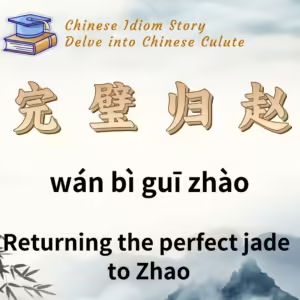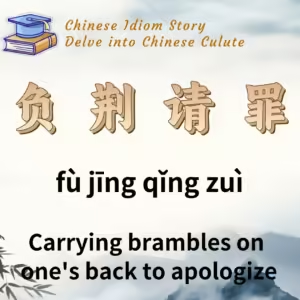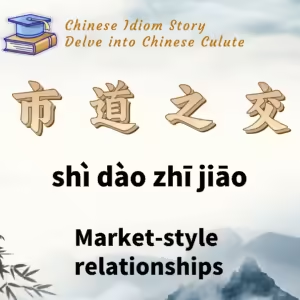
Chinese Idiom: 胶柱鼓瑟 (Jiao Zhu Gu Se)
English Translation: Glue the tuning pegs of the zither
pīn yīn: jiāo zhù gǔ sè
Idiom Meaning: This idiom metaphorically refers to being rigid and stubborn in one’s actions, adhering strictly to rules without knowing how to adapt or be flexible.
Historical Source: Records of the Grand Historian: Biographies of Lian Po and Lin Xiangru (《史记·廉颇蔺相如列传》)
Idiom Story:
The idiom “胶柱鼓瑟” comes from the story of Lian Po and Lin Xiangru, two notable figures in the Zhao State during the Warring States period, as recounted in Sima Qian’s Records of the Grand Historian. Lian Po was a skilled military commander known for his cautious and strategic approach, while Lin Xiangru was renowned for his diplomatic skills. Their contrasting personalities and eventual reconciliation form a significant part of this narrative.
In 262 BC, during the conflict between the Qin and Han states, the Qin army captured key locations, prompting the commander of the Han’s defense to surrender the territory to Zhao. In response, Zhao’s Prime Minister, Pingyuan Jun, traveled to accept the land, provoking the Qin. The Qin army, seeking revenge, launched a prolonged siege against Zhao, leading to the crucial Battle of Changping.
Lian Po adopted a strategy of restraint, refraining from battle, which proved wise as he thwarted the Qin for three years. However, Zhao Xiaocheng Wang, swayed by deception, decided to replace Lian Po with Zhao Kuo, a commander who lacked practical experience and relied solely on theoretical knowledge inherited from his father, Zhao She.
Upon hearing this, Lin Xiangru, who was ill at the time, cautioned the king against this decision, stating, “If you appoint Zhao Kuo as the commander, it would be like gluing the tuning pegs of a zither.” This analogy highlighted that just as a zither with glued pegs could not produce the right sound, Zhao Kuo’s rigid adherence to theory would prevent him from adapting to the realities of warfare.
Despite Lin Xiangru’s warnings, Zhao Kuo took command. Ignoring the tactical wisdom of Lian Po, Zhao Kuo engaged the Qin forces recklessly, leading to the annihilation of over 400,000 Zhao troops at Changping. Zhao Kuo himself perished, and Zhao State faced a near-collapse.
From this historical episode, the phrase “若胶柱而鼓瑟” was adapted into the idiom “胶柱鼓瑟,” symbolizing inflexibility and stubbornness in actions or thinking, illustrating the importance of adaptability and practical wisdom in governance and leadership.






